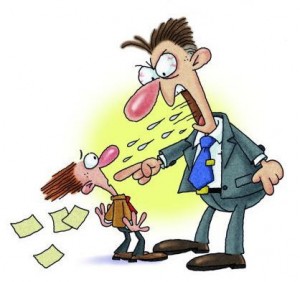 There is an expression in the workplace (also found on tee-shirts) that says, the beatings will continue until morale improves. It refers to the absurdity of management expecting people to feel better about their job and about themselves (morale) by constantly criticizing and shaming them (beatings). As crazy as this notion is, I find that it reflects an unconscious mechanism operating for many of us in our internal conversations. The validity of this mechanism often goes unchallenged and unchecked. How often have you done something that you consider stupid or absent-minded and then very quickly heard harsh internal criticism?
There is an expression in the workplace (also found on tee-shirts) that says, the beatings will continue until morale improves. It refers to the absurdity of management expecting people to feel better about their job and about themselves (morale) by constantly criticizing and shaming them (beatings). As crazy as this notion is, I find that it reflects an unconscious mechanism operating for many of us in our internal conversations. The validity of this mechanism often goes unchallenged and unchecked. How often have you done something that you consider stupid or absent-minded and then very quickly heard harsh internal criticism?
This is especially common for many of my brothers and sisters who share the affliction (blessing?) Attention Deficit Disorder (ADD) for which I am the poster child. People with ADD have a little problem with self-esteem due to the fact that we do 7 or 8 stupid things every day. We go upstairs on an errand, get distracted by something we see up there and return downstairs without the thing we originally wanted. We regularly lose our keys or lock them in our car, leave home without our wallet, our watch or our briefcase, forget to retrieve our laptop from under our seat in an airplane and show up at the bank counter without our bank deposit. My wife and I have worked out a way to minimize exacerbating this problem in the morning so that the day doesn’t start off on the wrong foot. She used to say to me, “What did you forget?” whenever she heard me re-entering the house five minutes after I had left. Now, she says nothing. She doesn’t acknowledge that I have returned home. I quietly retrieve what I forgot and leave again without any comment. I greatly appreciate her for that.
I don’t think you have to be ADD to be overly critical of your errors, however. From working as a therapist and coach for many years, I think most of us are that way. We operate from the presupposition that if we criticize ourselves harshly enough for our mistakes, we will make fewer of them in the future. We believe our behavior will improve by being unforgiving and angry with ourselves. I guess, when we become perfect, the criticism (beatings) will stop, huh? What are the chances of that?
I believe perfectionism arises as a solution to a problem faced in childhood – criticism from a beloved caregiver. When we are young, we think our parents are perfect so we take their criticism to heart. We believe their judgments of us to be valid and can’t see that maybe our parents are just frustrated or having a bad day.
To alleviate the pain of losing someone’s love (that’s what your parent’s criticism feels like when you are little) we may desire to be “above reproach.” This is where perfectionism is born. It’s as if we are saying, “If I were perfect, I would never get criticized and never lose my parent’s love. That’s what I will strive to become.” The harsh internal critic is created to help us become perfect so we can avoid the pain of being reproached. If we are harder on ourselves than anyone else could possibly be, maybe we can avoid criticism and always be loved. Unfortunately, this strategy doesn’t work. Have you ever known anyone who successfully criticized or castigated themselves into being great or feeling great? Even if they achieved a lot, did they seem happy in their relationships and pleased with themselves? Were they easy to be with? I haven’t met anyone like that yet.
The premise upon which this internal monitoring and criticizing mechanism is based is as absurd as my opening quote. Yet, the mechanism continues to operate without anyone challenging its value and un-plugging it. I’m not sure it can be unplugged but I do have a solution that, over time, has worked for me. When I make some absent-minded mistake, I still hear the judgmental voice blurt out in a sarcastic tone, “Oh, good one, Jim!” But now, I let the criticism drift away unanswered. Then I tell myself something that feels better like, “It’s okay” or “It’s not the end of the world” or “It’s probably all for the best.” Those thoughts restore me to my higher self. When I allow myself the benefit of the doubt, those gentler sentiments tend to carry the day. The critical internal voice may still speak first but what it says doesn’t carry the emotional weight it used to have.
I have the final word. When I choose to respond with acceptance, forgiveness and love, my morale and my behavior both improve.
I’d love to hear your thoughts about any of the above ideas. I look forward to your comments.





